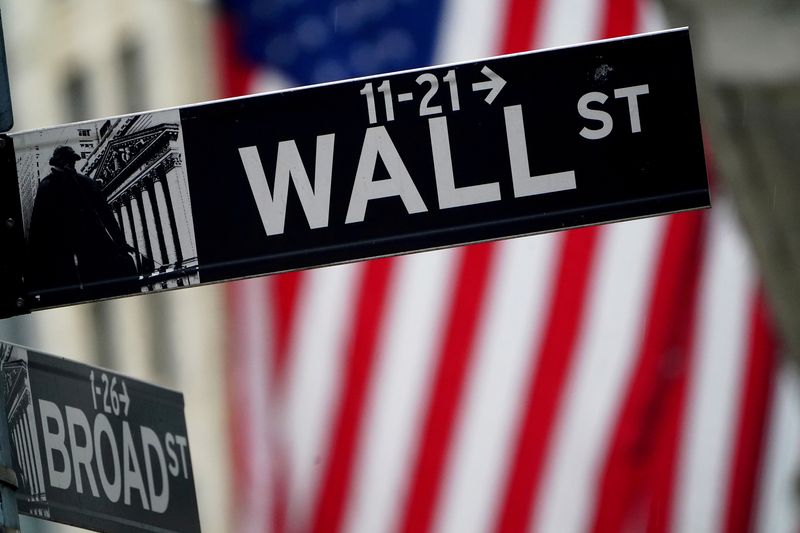Street Calls of the Week
LONDON (Reuters) -Earnings season gets into full swing, while the first snapshot of business activity in April could provide a sense of how much pain the turmoil in the banking sector has inflicted on the world economy.
China and Britain release key economic data and officials from the Group of Seven nations talk climate goals.
Here's a look at the week ahead in markets from Ira Iosebashvili and Saqib Iqbal Ahmed in New York, Li Gu in Shanghai, Rae Wee in Singapore, and Alun John and Dhara Ranasinghe in London.
1/ EARNINGS RECESSION
U.S. earnings season goes up a gear and the outlook is gloomy due to the regional banking crisis and the most aggressive monetary policy tightening in decades.
In addition to big banks such as Goldman Sachs (NYSE:GS), Morgan Stanley (NYSE:MS) and Bank of America (NYSE:BAC), big names reporting next week include Johnson & Johnson (NYSE:JNJ) and Netflix (NASDAQ:NFLX) on April 18 and Tesla (NASDAQ:TSLA) on April 19.
Analysts expect Q1 S&P 500 earnings to fall 5.2% from the year-ago period, Refinitiv I/B/E/S data as of April 7 showed. This would follow an earnings fall in Q4 2022, a back-to-back decline known as an earnings recession that has not occurred since COVID-19 blasted corporate results in 2020.
Yet with the bar set low, better-than-expected results, or upbeat guidance, could give stocks another lift. The S&P 500 is up roughly 6.5% in the year to date.
2/ SAVIOUR OF THE UNIVERSE?
Flash PMIs (Purchasing Managers Index) for April globally are out Friday and these real-time indicators of business conditions could provide an idea of whether banking turmoil is already affecting activity.
The IMF just cut its global growth forecast and warned problems in the financial sector meant the world economy was more likely to undershoot than surpass its estimates.
The PMIs should show whether growth is slowing, and, if so, where in the world and how quickly, questions fast becoming a major driver for markets as central banks near the end of rate hikes.
Traders are betting on the Federal Reserve cutting rates by year-end, an expectation predicated on a major U.S. slowdown in the second half.
Recent PMI data showed activity in Europe holding up relatively well. Any signs that remains the case could keep blue-chip European shares near 22-year highs.
3/ BULL NOR BEAR
China watchers are confused and upcoming data - including first quarter GDP, March retail sales and industrial output - may leave them just as befuddled.
Domestic inflation is muted, exports are rising and credit growth strong. The bear case can easily be made that subdued inflation is betraying a wary domestic consumer, banks are being forced to lend, and the bounce in exports will be short-lived as external demand ebbs and the likes of Apple (NASDAQ:AAPL) shift more production to Southeast Asia.
Those holding onto a bullish reopening thesis, however, expect more stimulus, and that could come next week too, as a big batch of central bank medium-term loans is repriced.
In a sign of which way the authorities want lending rates to head, smaller regional banks have already cut deposit rates.
4/ NO ALARMS, NO SURPRISES
It's a big week for UK data, with February jobs figures on Tuesday and March inflation numbers Wednesday.
Bank of England policymakers, who expect inflation to ease, may have their fingers crossed for good news. Inflation unexpectedly rose to 10.4% in February, pushed up by higher food and drink prices in pubs and restaurants, data that likely cemented the case for March's rate hike.
Markets anticipate at least one more rate increase. Sticky inflation remains the obstacle to just where rates will peak, with food inflation running at 18%, a level last seen in 1977.
Supermarket group Tesco (LON:TSCO) just cut the price of milk -- regarded as a staple in Britain -- for the first time since May 2020, a possible early sign that a surge in food inflation (and the BoE's inflation headache) may now abate.
5/ NET ZERO VS ENERGY CRISIS
Ministers from the Group of Seven nations convene in Japan this weekend for a meeting on climate, energy and the environment, while foreign ministers also gather ahead of a G7 Summit in Hiroshima next month.
The spotlight on net zero targets and addressing climate change could be stolen by the energy crisis, sparked by Russia's invasion of Ukraine, and ways to tackle it.
A case for new investments in natural gas supply could be made, even though assessments show that such investments would thwart globally agreed climate change goals.
Geopolitical tensions, meanwhile, could overshadow the gatherings. The G7's commitment to supporting Ukraine is likely a given, while U.S./China tensions over Taiwan remain in focus, with China's President Xi Jinping seeking to strengthen combat military training.
